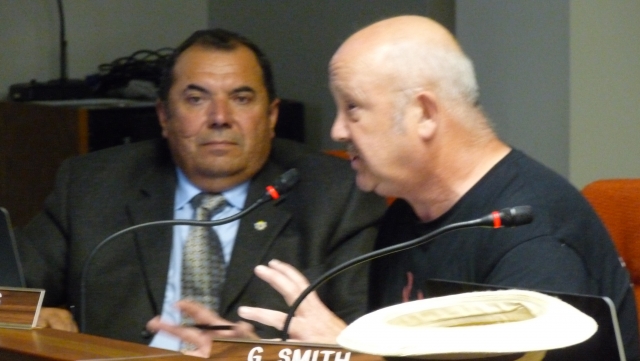Council says no to regulating marijuana
Grand Forks city council voted a resounding “no” to the idea of supporting the regulation and taxation of marijuana last night.
As a follow up to previous conversations at the council table about the Stop the Violence BC campaign, started by a group of B.C. mayors and law enforcement authorities to pressure provincial and federal governments to decriminalize, regulate and tax the widely used drug, Mayor Brian Taylor put the topic forward once again for a decision.
“This will be a big issue at (the upcoming Union of B.C. Municipalities meeting in September). I am asking… do you have a better way than what’s being suggested at this point by the movement that says stop the violence, let’s look at a different way of dealing with cannabis?” said Taylor.
“Twelve years ago I was a voice in the wilderness, now it’s everybody’s business; it’s a big part of UBCM. The list of people who have stepped forward and risked their political capital to speak out on this has been enormous. It’s the most movement and most momentum that I’ve seen in my lifetime.”
A motion against supporting the campaign was quickly put forward by councillor Neil Krog who, after joking about smoking marijuana as a youth, said this approach would not address the violence related to drug crime.
“Bottom line, it’s saying legalize marijuana,” said Krog. “I don’t want to make tax money off another vice because that’s what it is. I can’t see the tax revenue coming, and I don’t think I want the tax revenue coming in from that. They said if they regulate it, it would be similar to our liquor stores. Our provincial government has already stated they are looking at privatizing all of our liquor stores as well. So we won’t have as much control if government has control of it… It’s not our job.”
Many of the council members agreed that the current “war on drugs” is a failure, but what they couldn’t agree on was what the next step should be.
“I can’t say that I am in favour of marijuana smoking, but I do feel that the system that’s in place now is basically a lost cause. The war on drugs isn’t working,” councillor Bob Kendel added. “Whether it’s the Stop the Violence campaign or a modified version of that, I think that we have to collectively look at alternatives to what’s being done now.”
“I believe that trying to get control of (drug) use in the manner that we are using now is not successful and does breed violence. If the discussion is opened and everyone looks at it with a slightly different viewpoint, that there is a way to make this situation better. This is not just black and white, there is probably a grey area that we could do a better job dealing with the drug problem,” Kendel added.
While councillor Gary Smith agreed that the issue needs to be addressed, he sees this campaign as flawed.
“Calling it Stop the Violence campaign is a bit of red herring because it’s not really addressing the true issue we have to deal with which is the regulation of marijuana for the people who need it,” said Smith. “I support the idea to look at this because the current system isn’t working. (This campaign) is a distortion of what the true issue is.”
Councillor Cher Wyers used the campaign’s comparison to the prohibition of alcohol in the 20s as further evidence that a change to decriminalize marijuana would likely fail.
“It goes right back to prohibition of alcohol,” Wyers said. “What have we seen? Millions and millions spent in every province across the country in breathalyers, stopping and getting people off the roads when drinking, fetal alcohol syndrome babies, broken families, AA, and on and on. So did we win with alcohol? No. We’re the ones responsible for our actions. I strongly feel the answer is not in legalizing marijuana.”
After the vote on the motion, which was a five to two split, citizens present for the discussion took an opportunity to speak up in support of change to address the pressing social and health implications of continuing to criminalize youth and adults for this drug.
“In my view we actually have a huge social problem in the fact that we think we should solve our social problems with prisons,” said local resident Sandra Mark, a past youth worker. “We need to think much more broadly about what’s really going on and yes, people drink and have alcohol problems, those are real difficult things… The fact of the matter is if people get trapped in the criminal justice system, because of our laws, I’m just wondering who’s at fault here?”
Eight mayors of Vancouver, Burnaby, North Vancouver City, Vernon, Armstrong, Enderby, Lake Country and Metchosin initiated the Stop the Violence B.C. campaign in April of this year. The joint letter from the mayors called on leaders at all levels of government to take responsibility for marijuana policy, end prohibition and tax the drug.
“We see a seemingly endless stream of anti-marijuana law enforcement initiatives in our communities, yet marijuana remains widely and easily available to our youth. Based on the evidence before us, we know that laws that aim to control the marijuana industry are ineffective and, like alcohol prohibition in the U.S. in the 1920s, have led to violent unintended consequences,” they said in the letter delivered to B.C. Premier Christy Clark, Opposition leader Adrian Dix and John Cummins.
Not only is the prohibition costly to maintain for enforcement and harm reduction, the mayors gave a compelling case to regulate and tax the drug.
“…the province’s massive illegal marijuana trade drives organized crime in BC and throughout the Pacific Northwest. The Organized Crime Agency of BC estimates that organized crime groups control 85 percent of BC’s marijuana trade, which the Fraser Institute estimates is worth up to $7 billion annually. U.S. federal prosecutors have identified B.C.-based drug gangs that control the marijuana trade as “the dominant organized crime threat in the Northwest,”” continued the letter.
Although momentum is building across the province for this campaign, Grand Forks as a whole will not be a participant in this movement.
























Comments